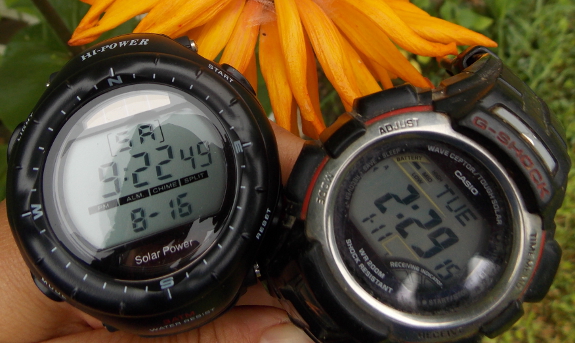
Solar-powered watch

Back
in 2003 when my previous watch died, I decided I wanted a watch that would
really go the distance. With my usual supreme unconcern for
aesthetics, I chose the huge specimen shown on the right above, and that watch has
served me very well. Between waterproofness, shock resistance,
solar battery charging, and automatically setting the time every night
using something I can't recall (radio waves from Texas?), I haven't had
to deal with watch issues in over a decade.
But all good things must
come to an end. The battery inside my beauty finally stopped
accepting a charge a few months ago, and I decided to buy a new watch rather than a new
battery. Over the last decade, due to Mark's hard work to smooth down
the edges of my type-A personality, I've stopped wearing a watch every
day and instead simply use my time piece to check the hour if I wake up
at night, to jerk me out of sleep once or twice a year when I can't wake
at my normal pace, and to monitor how long we've been rubbing rocks
when counting stream macroinvertebrates. I do
like the solar feature of my old watch since longevity is always a
boon, but since I rarely take watches out in the field now, I'm willing
to bypass the extreme waterproofing and shock resistance. I'm even
willing to set my watch twice a year to take care of daylight savings
time the hard way.
Despite that willingness
to downgrade, I put off buying a replacement watch for months. I
remember my old watch was pretty pricey (although I don't recall the
exact figure), and I wasn't sure I was willing to spend so much
again. But apparently solar technology has come down considerably
in the last decade. A simple solar watch now costs under $10 even after you factor in shipping!
At that price, and with such good reviews, Mark said he wanted one
too. Here's hoping my second solar watch will last another 11
years, not just the 6 years promised by the manufacturer.
Want more in-depth information? Browse through our books.
Or explore more posts by date or by subject.
About us: Anna Hess and Mark Hamilton spent over a decade living self-sufficiently in the mountains of Virginia before moving north to start over from scratch in the foothills of Ohio. They've experimented with permaculture, no-till gardening, trailersteading, home-based microbusinesses and much more, writing about their adventures in both blogs and books.
Want to be notified when new comments are posted on this page? Click on the RSS button after you add a comment to subscribe to the comment feed, or simply check the box beside "email replies to me" while writing your comment.

You can look at the semi-bright side: if it cost $10, you'll come out ahead even if it only lasts 2 years. The Casio probably cost close to $70 before.
I'm impressed you got 10 years out of it. That's a long time for a battery to function.
I've been wearing automatic watches since I was a kid.
I wore my first automatic watch for around 25 years. The only reason I bought another one was that the nickel or chrome plating on the brass case was wearing away in places, and I got green stains on my skin and clothes from oxidizing copper.
So I bought another automatic with a stainles steel case, which I figure will last me the rest of my life.
While it is true in the strict sence that a mechanical watch isn't as accurate as a quartz watch, by and large that doesn't matter. The accuracy is more than enough for whatever you'll generally use a watch.
Since it uses your arm movements and gravity to move an excentric rotor to wind the mainspring, you have to wear it to keep it wound. But a mechanical spring can survive many more charge cycles than a battery.